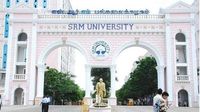Chennai: SRM University has suspended Assistant Professor Lora following allegations that she shared anti-India remarks on social media in the aftermath of "Operation Sindoor," a recent military operation by Indian forces against terrorist infrastructure in Pakistan and Pakistan-occupied Kashmir. A social media account under the name "Verbal"—believed to be linked to Prof. Lora—posted content criticizing India’s actions. One post accused the Indian government of targeting innocent civilians in Pakistan and dismissed the military operation as an "election stunt." Another claimed that current policies would lead to food shortages, curfews, and inflation in India.
The posts quickly went viral, with hashtags like #AntiIndiaProf and #SRM trending across platforms. Critics, including political figures and social media users, condemned the remarks as "irresponsible" and "against national interest." BJP leaders, such as state secretary S.G. Surya, demanded strict action, calling the statements "anti-national."
SRM University responded by placing Prof. Lora under immediate suspension pending an investigation. The suspension order, issued by Registrar Dr. S. Ponnusamy on May 8, 2025, cited "unethical conduct" and violation of institutional policies. While the university has not officially confirmed whether the "Verbal" account belongs to Prof. Lora, the matching profile details—including her name and university affiliation—have fueled public suspicion. The administration has assured a fair inquiry but emphasized that indiscipline and inflammatory remarks would not be tolerated.
BJP functionary Bala, who first circulated the controversial screenshots, questioned whether SRM University implicitly endorsed such views. Meanwhile, S.G. Surya praised the institution’s swift response, stating that "any anti-national ideology must be publicly condemned." The controversy surrounding the suspension has sparked a broader debate about academic freedom and the responsibilities of educators in politically sensitive times.
In the wake of the military operation, Prof. Lora reportedly took to WhatsApp, saying, "India killed a child in Pakistan and wounded two people in the early Wednesday strikes," referring to the events of May 7, 2025. She condemned the act of "killing innocent lives for your own bloodlust and election stunts...it is not justice. It is a cowardly attack." Her remarks drew attention to the reported 26 civilian casualties, including women and children, as claimed by Pakistani authorities.
In another post on social media, she warned that the escalation could result in "economic shutdown," "food shortage," and "loss of life" for the next decade. Following these posts, SRM University issued a suspension order citing "unethical activities," stating that an inquiry into her conduct had been initiated. As part of this process, her faculty profile has also been removed from the university's website.
Prof. Lora has been a part of SRM University since 2012, and the institution is owned by TR Paarivendhar, the founder of the Indiya Jananayaka Katchi, a political group that aligned with the Bharatiya Janata Party (BJP) in the 2024 Lok Sabha elections. This connection has added another layer of complexity to the situation, as some observers speculate that the university's response could be influenced by its political affiliations.
The incident raises important questions about the balance between free speech and the potential consequences of public comments made by educators, especially in a politically charged environment. As the investigation unfolds, many will be watching closely to see how SRM University navigates this contentious issue.
Critics of Prof. Lora's comments argue that educators should be held to a higher standard, especially when their remarks may undermine national interests. Supporters, on the other hand, contend that academic freedom is essential for fostering open dialogue and critical thinking, particularly in discussions related to military actions and their implications.
As the discourse surrounding this case continues, it serves as a reminder of the challenges faced by individuals in academia who dare to voice dissenting opinions, particularly in a country where nationalism is a potent force. The outcome of the university's inquiry may have lasting implications not only for Prof. Lora but also for the broader academic community in India.
In a time when social media amplifies voices and opinions, the line between personal expression and professional responsibility can often become blurred. The SRM University case is just one of many instances where educators find themselves at the intersection of free speech and institutional policies.
As the investigation proceeds, it remains to be seen how SRM University will address the concerns raised by both supporters and critics of Prof. Lora's statements. The university's response will likely set a precedent for how similar cases are handled in the future, shaping the landscape of academic discourse in India.
In conclusion, the suspension of Assistant Professor Lora serves as a flashpoint in the ongoing debate over academic freedom, national sentiment, and the role of educators in politically sensitive discussions. As the inquiry unfolds, the academic community and the public alike will be watching closely to see what implications this case holds for the future of free expression in educational institutions.




